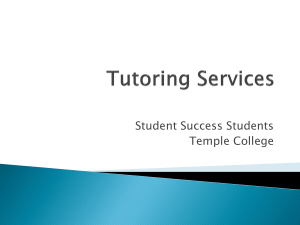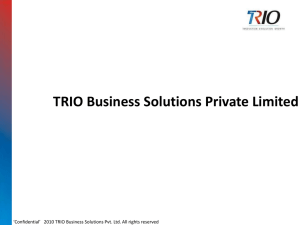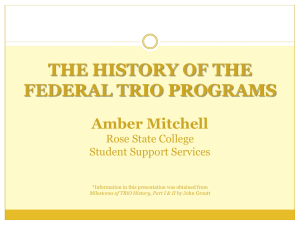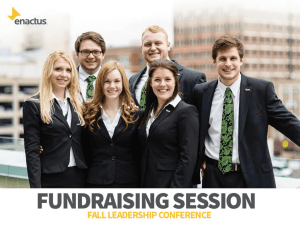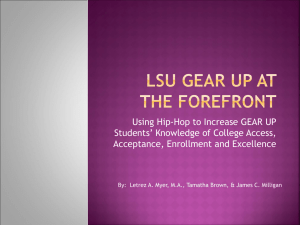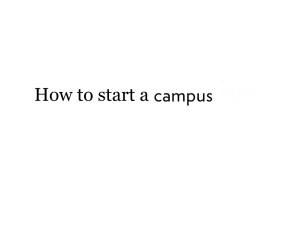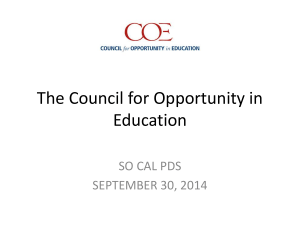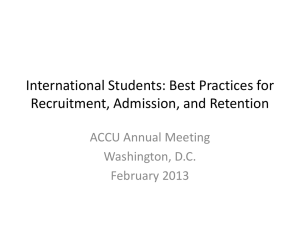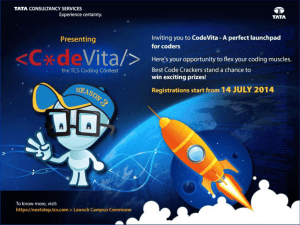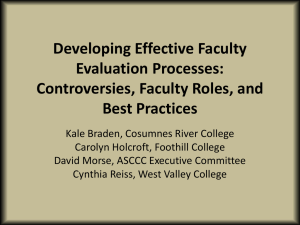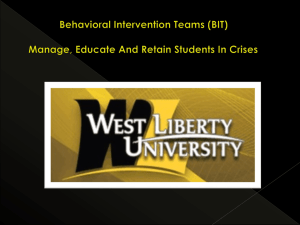Findings from a National Survey of College Outreach Programs
advertisement
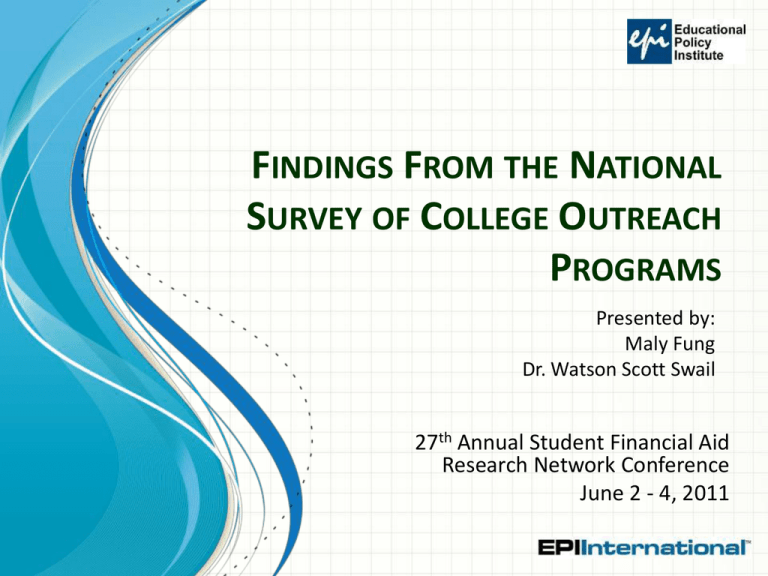
FINDINGS FROM THE NATIONAL SURVEY OF COLLEGE OUTREACH PROGRAMS Presented by: Maly Fung Dr. Watson Scott Swail 27th Annual Student Financial Aid Research Network Conference June 2 - 4, 2011 ABOUT THE STUDY Background Information • In 2010, EPI received a TG Public Benefit Research Grant to survey college outreach/access programs around the nation • The survey was based on an earlier version created by Dr. Watson Scott Swail in 2000 for The College Board. Methodology The National Survey of College Outreach Programs (NSCOP) consisted of 10 sections: 1. 2. 3. 4. 5. 6. 7. 8. 9. 10. General Information Program Information Goals and Services Program Operation Staff and Training Student Characteristics Operating Budget Program Outcomes Program Evaluation Barriers to College Access Methodology – cont’d • The survey was distributed electronically to national association mailing lists, including the National College Access Network (NCAN), federal GEAR UP and TRIO lists, the Association of Institutional Research (AIR), NCCEP, and the National Partnership for Educational Access (NPEA). Methodology – cont’d • Examples of programs considered included: – GEAR UP and TRIO Programs – Non-federal community-based – Summer Bridge programs that help students during the transition from high school into college – Programs that enhance self-esteem – Bring students to campus to learn skills to succeed in college Methodology – cont’d • Examples of programs NOT included in the study were: – Articulated high school programs – Campus sports – Dual Enrollment programs – Short, one-time episodic events SUMMARY OF FINDINGS Distribution of Programs by Type Private N=14 TRIO N= 105 UniversityFunded N=63 28% Other N=73 17% Nonprofit N=52 14% 4% Partnerships N=48 20% 13% Other Federal N=11 GEAR UP N=39 CACG N=16 10% 4% State-Funded N=26 7% Percentage of Outreach Programs (N=374) 3% Distribution of Programs By Geographic Location Programs by First Year of Operation Program Type Year First Operated Median Range All 1999 1963 - 2010 CACG 2007 1982 - 2010 GEAR UP 2005 1989 - 2005 TRIO 1990 1965 - 2010 State-Funded 1990 1969 - 1998 University-Funded 2003 1969 - 2010 Nonprofit 1997 1966 - 2010 Partnerships 2001 1967 - 2010 Private 1998 1963 - 2008 Federal 2005 1989 - 2010 Other Programs by First Year of Operation – cont’d Number of Programs by 1stYr of Operation 172 149 46 1 Before 1960 Between 1960 & 1979 Between 1980 & 1999 After 2000 Distribution of Programs by Sponsoring Agency College Campus Elementary/ Secondary School Community Center Other N (% of Programs) N (% of Programs) N (% of Programs) N (% of Programs) All 189 (50.5%) 77 (20.6%) 61 (16.3%) 47 (12.6%) CACG 5 (31.3%) 4 (25.0%) 4 (25.0%) 3 (18.8%) GEAR UP 12 (30.8%) 23 (59.0%) 1 (3.6%) 3 (7.7%) TRIO 79 (75.2%) 17 (16.2%) 7 (6.7%) 2 (1.9%) State-Funded 13 (50.5%) 3 (11.5%) 3 (11.5%) 7 (26.9%) University-Funded 46 (73.0%) 3 (4.8%) 4 (6.3% 10 (15.9%) 2 (3.8%) 15 (28.8%) 27 (51.9%) 8 (15.4%) Partnerships 20 (41.7%) 8 (16.7%) 10 (20.8%) 10 (20.8%) Private 5 (35.7%) 3 (21.4%) 5 (35.7%) 1 (7.1%) Federal 7 (63.6%) 1 (9.1%) 0 (0.0%) 3 (27.3%) Nonprofit Other Distribution of Programs by Location of Services College Campus Elementary/ Secondary School Community Center Other N (% of Programs) N (% of Programs) N (% of Programs) N (% of Programs) All 144 (38.5%) 144 (38.5%) 26 (7.0%) 57 (15.2%) CACG 2 (12.5%) 7 (43.8%) 2 (12.5%) 4 (25.0%) GEAR UP 3 (7.7%) 33 (84.6%) 0 (0.0%) 3 (7.7%) TRIO 54 (51.4%) 39 (37.1%) 2 (1.9%) 9 (8.6%) State-Funded 13 (50.0%) 6 (23.1%) 1 (3.8%) 6 (23.1%) University-Funded 41 (65.1%) 12 (19.0%) 3 (4.8%) 7 (11.1%) 5 (9.6%) 24 (46.2%) 13 (25.0%) 10 (19.2%) 16 (34.0%) 14 (29.8%) 4 (8.5%) 13 (27.7%) Private 5 (37.5%) 7 (50.0%) 0 (0.0%) 2 (14.3%) Federal 5 (45.5%) 2 (18.2%) 1 (9.1%) 3 (27.3%) Nonprofit Partnerships Other Program Goals Percentage of Programs that Identify Goals Increase Likelihood of Attending College Increase College Awareness Provide Exposure to College Increase Likelihood of Completing College Improve Academic Skills Provide Role Models Encourage Rigorous Course-Taking Improve Self-Esteem Encourage Parental Involvement Increase High School Persistence/Prevent… Provide Recreational or Cultural Opportunities Encourage Long-Term Financial Planning Promote Interest/Strength in Subject Area Improve Vocational Skills 92.8% 92.0% 91.2% 79.9% 78.9% 76.7% 71.9% 69.8% 66.3% 65.2% 58.0% 57.0% 36.4% 21.1% Students Targeted Percentage of Programs by Target Population Low Income First Generation College Historically Underrepresented Minorities Low Academic Performance Male Female At-Risk, Stop-Out, Drop-Out ESL Students Gifted/Talented Students Learning Disabilities High School Students Middle School Students High School Graduates Elementary School Students 84.8% 77.5% 64.7% 33.4% 32.9% 32.1% 22.2% 20.6% 17.4% 12.8% 65.2% 38.0% 11.0% 10.7% Instructional Approach Percentage of Program that Use Instructional Approach Workshops 85% Mentoring 68% Role Models 67% Classroom Instruction 66% Tutoring Assessment & Testing Peer Learning Groups 63% 51% 44% Academic Services Percent of Programs Providing Academic Services Study-Skills Training Critical Thinking Skill Development Preparatory Courses Test-Taking Skills Grade and Attendance Monitoring Mathematics/Science Instruction Academic Enrichment Courses Reading/Writing Instruction Computer-Training Skills Remedial Instruction College-Level Courses Accelerated Courses Below the College… 61.5% 56.4% 56.1% 55.9% 55.3% 53.2% 51.6% 51.3% 38.0% 34.8% 30.7% 28.9% Non-Academic Services Percentage of Programs Providing Non-Academic Services College Awareness 86.9% Campus Visits and Tours 74.9% Social Skills Development/Confidence… 69.8% Career Counseling and Information 68.4% Academic Advising 65.0% Cultural Activities and Field Trips 61.0% Personal Counseling 58.0% Meetings with College Faculty/Students 56.4% College Fairs 52.9% Career Days Employability Skills Training Job Placement Assistance 37.7% 27.3% 21.1% Program Admissions and Capacity Less Than a Year 5 Years 6% 5% 4 Years 26% Admissions Process Must Apply 1 Year 11% Specifically Targetted Parent Contract Based on Parent… More Than 5 Years 22% 2 Years 15% 3 Years 15% Percentage of Programs by Number of Years Students Participate 61.0% Competitive Admission 52.7% 46.0% 35.0% 31.0% Open Enrollment 27.8% First-Come, First-Serve 17.4% Program Capacity – cont’d Program Capacity Max. # of Students Max. # of Parents All 33,794 42,992 CACG 7,380 978 GEAR UP 3,291 2,858 TRIO 470 35 State-Funded 399 213 1,971 70 280,213 306,026 2,694 637 University-Funded Nonprofit Partnerships Other Private 575 139 Federal 5,816 1,522 Students Served in 2009-2010 Hispanic/Latino 45.7% Black/African American 22.6% White 21.8% Asian or Pacific Islander 5.7% Other Race/Ethnicity 3.3% American Indian/Alaskan Native 0.8% Low Socioecomic Status Female Male 66.4% 57.7% 42.3% Parental Component Yes (No Answer) 2% No 33% Yes (Not Mandatory) 45% Yes (Mandatory) 20% Percent of Programs with Parental Component Parental Component Percentage of Programs Providing Services to Parents College Awareness 58.3% Financial Aid Counseling/Guidance 54.5% Academic Classes 40.0% Participation in Student Activities 39.3% Campus Visits and Tours 35.8% Motivational Speakers 24.6% Meeting with College/University Faculty… Instructional Programs Family Counseling 24.1% 14.2% 9.1% Program Incentives Percentage of Programs that Offer Incentives Certificate of Recognition 44.4% Scholarship 37.4% Dinner/Party 36.1% Special Recommendation 23.5% Cash Stipend 23.3% Academic Credit Tuition/Fees Reimbursement 15.0% 12.3% Program Operation Summer Only N=33 9% Academic Year Only N=77 21% Academic Year AND Summer N=262 70% Period of Operation, All Programs Program Operation – cont’d Program Duration More Than One Acad Yr Full Academic Year 35.6% 22.2% One Week 2.7% One Semester 2.1% One Month 1.9% One Summer 0.5% Time of Services Provided After School Hours During School Hours Episodic Events On Weekends 71.1% 66.3% 60.8% 54.0% Funding and Support In-Kind Financial Support N (% of Programs) N (% of Programs) Tuition/ Fees N=16 Internal 5% N=59 17% ALL PROGRAMS Federal Government 2 (0.5%) 169 (45.2%) AmeriCorps 26 (7.0%) 11 (2.9%) State Government 30 (8.0%) 74 (19.8%) Local Government 23 (6.1%) 17 (4.5%) 104 (27.8%) 21 (5.6%) Community Organization 80 (21.4%) 30 (8.0%) Business/Industry 45 (12.0%) 58 (15.5%) Private Foundation 18 (4.8%) 120 (32.1%) Individuals 52 (13.9%) 58 (15.5%) 128 (34.2%) 64 (17.1%) 5 (1.3%) 65 (17.4%) Local School System External N=262 78% Primary Source of Funding Colleges/Universities Fundraising Staffing & Training Percentage of Programs with Pre-Service Staff Training No N=63 16% Frequency of Staff Meetings (Percentage) Have Regular Meetings 93.3% Meet Weekly 35.3% Meet Monthly 23.8% Meet Biweekly 20.9% Meet Less than Monthly 13.4% Yes N= 311 83% Monitoring & Tracking Percentage of Programs Who Track Students 86% 66% 59% 36% Monitor Student Progress Track Students After Program Completion Track Students After High School Track Students After College Graduation Program Evaluation Percentage of Programs Who Conduct Evaluations and Frequency 85% 67% 15% Conduct Evaluations Conduct Evaluations Every Year Conduct Evaluations According to Another Schedule 3% 2% Conduct Evaluations Every Two Years Do Not Conduct Evaluations QUESTIONS? CONTACT US 801 N. Quincy Street, Suite 700 Arlington, VA 22203 (703) 875-0701 www.educationalpolicy.org
